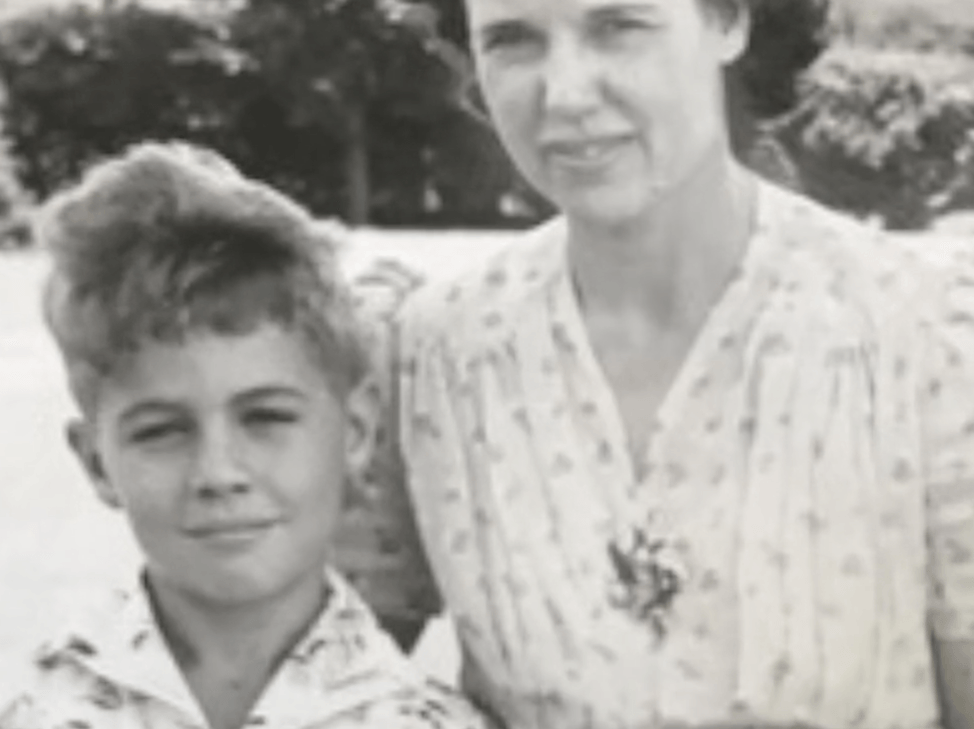The Making of James Blue
What was very important for me in making [The Olive Trees of Justice, filmed in Algeria] was that I found out what roots I had in America and how much I belonged in America.[1]
The Landscapes of Oklahoma and Oregon
You can view many of James Blue’s films, including some he made as a student, on YouTube, or read his complete filmography at the James Blue Project.
At the UO, Blue studied theater with Horace Robinson (namesake of the Robinson Theatre), speech with Robert D. Clark (namesake of the Clark Honors College), and radio and television production with Glen Starlin. Blue starred in several plays and worked for KWAX radio station as a producer. Blue and James Ivory (who would later emerge as a major figure in the film world) learned French in the same classes. Robinson, Clark, and Starlin recommended Blue for the prestigious graduate program at the Institut des hautes études cinématographiques (IDHEC) in Paris.

James Blue and his mother, late 1930s or early 1940s. Photo courtesy of Suzanne Clark.
The Landscapes of Paris, Algeria, and Colombia
The Landscapes of the United States and Washington, DC: Blue’s Roots
In an interview with Mary Batten, Blue makes explicit the similarities between Jean, the protagonist of Olive Trees, and himself, and between the problems of racism, identity, and violence in Algeria and those in the United States. Blue witnessed bombings during the civil war in Algeria. When he returned to the United States in 1963, the country was suffering through a violent summer of racial violence.
In his exchange with Batten, Blue captures the primary motivation behind and the argument he would develop in The March:
For more on James Blue’s life and work, visit the James Blue Project and the James Blue Alliance.
For more on James Blue’s life and work, visit the James Blue Project and the James Blue Alliance.
What [Jean] has seen, what he has suffered, and what he has been submitted to – all that, until that minute, was going to drive him from Algeria – make him realize that he has his roots. All of the things that had driven him away from Algeria are the things that unite him to it. It’s a realization of his responsibility and of his hope that there is something to be done. …
What was very important for me in making this film … was that I found out what roots I had in America and how much I belonged in America. The parallels between Algeria and America were enormous as far as I could see, not only from the racial standpoint – the race problem had a different aspect there; it wasn’t a color problem, but nevertheless, it was pretty acute. It was the thing that created the Algerian war. I think that it’s very important to get away, to be able to see your country better, as another country and not as the only way the world is. In Algeria I found a younger America, with more essential problems at hand. In Algeria it wasn’t making a buck; what was essential was whether you were going to live.
You had the feeling that the fate of a nation depended on people getting along together. Well they didn’t get along together and the nation split apart.
BATTEN:
More and more the United States is reaching that point.
BLUE:
We’re going to reach that point. I think we are.
BATTEN:
Birmingham certainly demonstrates the necessity of people getting along with each other.
BLUE:
I think that Birmingham is just one little outbreak of a problem that’s in the blood of America, that can break out anywhere. We’ve got to cure the source. The fate of Algeria, as part of France depended upon integration – whether people could live together without one group being superior to the other. Even the best paternalistic situation is unbearable because people now have realized that no one can lord it over anyone else. Certain elements believed that there was no way to French and Arab understanding, that Algeria was always destined to break away and to become independent. I think there was hope for a French Algeria if it had been humanly and equitably regulated from the first; but of course there is always the question of original sin in a conquest. [2]
The front page of James Blue’s CV. Click to download the full CV as a PDF.
Archival Resources
This document comes from the James Blue papers (Coll 458), Special Collections and University Archives, University of Oregon. It is reproduced with the permission of their copyright holders.

